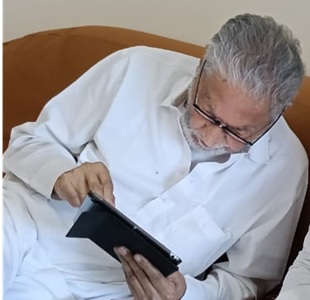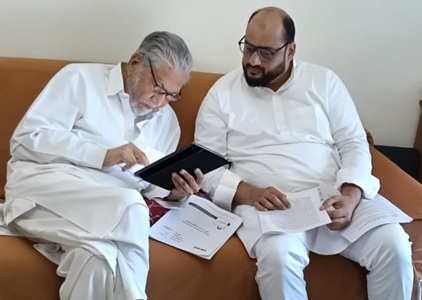By Dr Javed Jamil
Recently a Hindu friend of me asked me why Muslims do not give up their attitude of believing that Islam is the best, and argued that unless Muslims gave up this belief, unity with Hindus is not possible. He was responding to an article of mine calling for the coming together of Hindus and Muslims in India in fighting against the vices, believed to be so by both, instead of spreading hatred against each other. Normally, such views are representative of two kinds of groups. One group is of the propagandists who are part of the campaign against a certain community, and the other is that of interfaith loyalists who in the garb of inter-faith dialogue are bent on diluting the religion.
I tell both kinds of people that what is bad is not the conviction in one’s own ideology but in describing other’s convictions as false and speaking words of hatred against communities. If for example, a Hindu thinks Hinduism is the best he cannot be faulted because why he would be a Hindu if he does not think it is the best. If in his eyes, Hinduism is not the best religion, he should better try to find the best. The same will be true of a Muslim, Christian or anyone identifying himself with any other ideology. I live in India, and I know that the overwhelming majority of Indians, Hindus as well as Muslims are strong believers in their religions. In terms of their cultural and social beliefs and practices, they have much bigger similarities than differences. So instead of countering each other on the grounds of differences, they need to come together against the common concerns.
There has been an outcry in recent times with people trying to present religion as a destabilising force. The truth however is that it is not the religion but the economic fundamentalism, its tirade against religion and its attempt to marginalize religion, which is primarily responsible for much of the chaos in the present world. It is in this context that the need of forging an alliance of all religions is there. But the question arises: Should this unity of religions be only aimed at having more cordial relations among the people of different faiths, or should it be directed at a larger objective?
Throughout the history, religion has played a significant role in the individual and social affairs of human beings. For most of the people that flourished in different regions of the planet earth and in different eras, faith has been a sine qua non for their existence. In spite of the fact that religion has more often than not been defiled or contaminated by the self seeking clerics, it has earnestly and relentlessly endeavoured to discipline life by erecting the ethical fence around it. It has almost been a periodical phenomenon that the prophets and sages arrived with sublime messages of highest virtues, and no sooner did they depart, their followers successively adulterated those with immoralities and indecencies. Yet, it is an irrefutable truth that it is mainly owing to the strong influences on human minds and hearts wielded by religion that truth, honesty, sacrifice for others, justice and mercy have always been regarded as commendable virtues in society, even if the constituent members of society have not, generally, put them into practice. What is, indisputably, commendable is that religion assisted mankind in overcoming dilemma of routine life at a time when it was not advanced enough to, objectively, discriminate between the right and wrong. In the midst of all-pervading gloom, the solitary torch of religion shone; whoever had the eyes that could observe it, darkness made exit from his life.
The faiths that have been dominant in the world during last few millennia – Hinduism, Zoroastrianism, Judaism, Buddhism, Jainism. Christianity, Islam and Sikhism — all have, without exception, magnified moral values. No religion preaches falsehood, dishonesty, cheating, bribery, hatred, violence, adultery and fornication. Each of them eschews, albeit in varying degrees, this-worldliness; Jainism and Buddhism, altogether, condemn this life; Christianity promotes celibacy; and Islam, while permitting necessities and enjoyment of life within prescribed limits, promotes love for other-worldliness. Religion aims at achieving peace, and gives less importance to material gains. This principle applies to all religions, and this is what annoys most the economic fundamentalists; for promotion of materialism reigns supreme in their scheme of things. Their plan cannot succeed, unless people became least entangled in moral dilemma, and the love of this worldliness ravishes that of the other-worldliness; if honesty rules the roost in their life, sex outside the ambit of marriage is considered immoral and illegal, self-sacrifice lords over their hearts and minds, and deceit and falsehood haunt their conscience, how would they be persuaded to “enjoy” the “comforts of life” (without unduly caring for right and wrong) that the merchants seek to market with great fanfare.
“Secularism” in West was mainly aimed at the negation of religion with either total abandoning of religion or its privatisation and marginalisation. The growth of Secularism in India was on a different pedestal altogether. Unlike West and Islamic countries like Turkey and Egypt, it was not primarily aimed at the negation of religion; it was more a product of the plural nature of Indian society that was composed of several religious groups and sects, many of which have considerably large population in the country. Nor secularism in India chose to deny after-life. In contrast, it developed as an ideology of the state that gives due respect to all religions, but will not have any religion of its own. A secular person in India need not be anti-religion or non-religious. He may in fact be a devout practitioner of the rituals and values preached by religion. His secular credentials become disputable only when he, by speech or action, shows disregard for the other religious communities, or spreads hatred against them. Gandhi, Sardar Patel, Maulana Abul Kalam Azad, Maulana Mohd. Ali Johar, Pt. J.B.Pant — all these political stalwarts were either devout Hindus or devoted Muslims, and still secular to the fore. The opposite of ‘secular’ in India has not been, as in the west, sacred but communal.
Time has now come when the religionists belonging to all religions need to be emphatic about the true aims of religion. They must recognize the fact that the anti-religion economic forces have successfully turned one religion against another. Religions seem to be fighting one another instead of fighting their common enemy: Irreligion and the dominance of the ideology of economic fundamentalism in the affairs of life. The people today are merely interested in the rituals of the religion without inculcating the morality, honesty, integrity, perseverance, patience, purity and God’s fear and love in their minds and without waging a fight against the social vices. The market forces are commercializing human susceptibilities in a big way. Beaches, Casinos, Bars, Nightclubs, Nude women, prostitution, etc have become symbols of freedom. Foetuses are being killed in the name of Women’s rights, criminals are being protected in the name of human rights. Everybody talks of Rights. Nobody talks of Duties and Fundamental Prohibitions, without which a peaceful society cannot develop. While all religions are to unite, the primary duty lies with four big religions: Hinduism, Buddhism, Christianity and Islam. Christianity, Judaism and Islam need to work together in West, and Hinduism and Islam need to initiate the movement in India taking Christians, Buddhists, Sikhs and Jainis along with them.
But if any two communities can be the true leaders in the revival of true religion, it is Muslims and Hindus of India. India is a deeply religious country where 95 pc of the people believe in God and the importance of the religion. Hindus and Muslims together form more than 90 pc of the population. If they come together, they can become a role model for the whole world. Their views regarding the integrity of family system, sanctity of marriage and against prostitution, pornography, alcohol, gambling, economic disparity, corruption and inflation are almost the same. Why can they not come together on these issues and work for a cleaner, purer, healthier, more peaceful and more prosperous society?
* Dr Javed Jamil is India based thinker and writer with over a dozen books including his latest, “Muslims Most Civilised, Yet Not Enough” and “Muslim Vision of Secular India: Destination & Road-map”. Other works include “The Devil of Economic Fundamentalism”, “The Essence of the Divine Verses”, “The Killer Sex”, “Islam means Peace” and “Rediscovering the Universe”. He can be contacted at doctorforu123@yahoo.com or 91-8130340339. For his shayri visit http://urduyouthforum.org/shayari/poet-Dr-Javed-Jamil.html







0 Comments